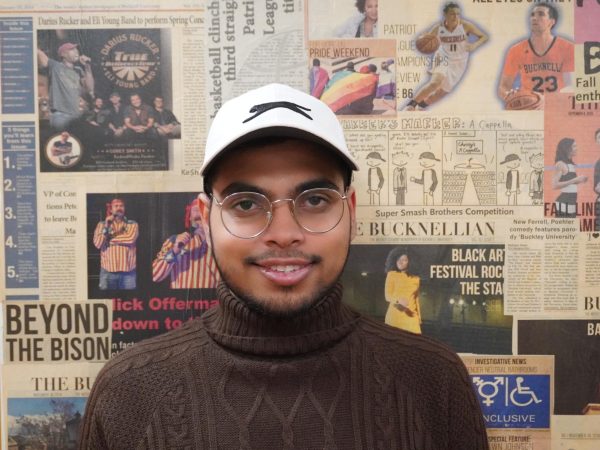Imagine this: a humanities major sits in Bertrand Library, feverishly reading for a seminar on postmodernism, while across the quad, an engineer strides by, armed with a calculator, as though they’re about to single-handedly save civilization with a wrench and a spreadsheet. We get it, engineering is impressive—but let’s talk about the real underappreciated intellectual champions of Bucknell. For instance, have you ever stopped to ponder how a Theatre and Dance major who’s managed to bring tears to your eyes in a campus production juggles multiple characters, costume changes and, let’s face it, impeccable eyeliner skills? Or the quiet brilliance of the Religious Studies major, who could dismantle centuries of cultural assumptions over a single cup of coffee? Bucknellians, let’s pay homage to the underrated heroes of academia.
Let’s talk about the Theatre and Dance department. These students are not just reciting lines—they’re embodying them. While the engineers are out there plotting to build tomorrow’s skyscrapers, Theatre and Dance students are asking life’s most pressing questions: Who are we? Why do we dance? Can jazz hands cure existential dread? And while engineers find joy in calculating force and friction, Theatre majors are proving they’re Newtonian legends too, mastering the art of timing and stage gravity. Forget particle physics; you try nailing a pirouette mid-performance with 200 eyes on you.
And then there are the Humanities—the timeless realm of subjects like Philosophy, History and English. Some might argue they’re relics from another age, but anyone who’s ever debated a Philosophy major knows that a Socratic question can cause as much headache as a differential equation. Why study the classics when you could be designing engines? Because, while engines propel cars, the Humanities propel ideas. These students are dealing in the currency of thoughts, something that no algorithm can replicate. One day, when the robots do take over, we’ll need someone with an appreciation of Hamlet to remind us what it means to be human.
Now, here’s where things get real. The Religious Studies major embodies the subtlety and grace of a discipline that answers to both the past and the future. Take RELI 224: Global Religions and the Politics of Pluralism. That course title alone is a masterclass in intellectual prowess—have you tried explaining the intersection of politics and pluralism in five minutes? While others are working to design the next best tech gadget, Religious Studies majors are dissecting the ethical impacts of those gadgets on global cultures. The next time you wonder why world peace hasn’t been achieved yet, just remember: these students are in class figuring out how it could be.
In the tech-driven world of Bucknell, we’re told that the “future” speaks in code. But the Language majors laugh in multiple languages. From German to Arabic, French to Mandarin, these scholars are living proof that the world is far larger than any algorithm. Instead of becoming yet another cog in the wheel of Big Tech, Language majors are out there with the real-world superpowers of translation, empathy and yes, diplomacy. The next time we need someone to de-escalate an international incident, don’t look to the coders—call a French major.
While engineering students pride themselves on understanding the laws of the universe, Sociology and Anthropology majors are dealing with an even messier world—the human one. It’s one thing to calculate trajectories, but to predict human behavior? That takes a real scientist. These are the students who will one day write the books on why society functions as it does (or doesn’t). After all, when robots and humans finally cohabit on Earth, who do you think will navigate the culture shock? You guessed it—the sociologists.
While we all know the stats, engineering majors often graduate to hefty paychecks, let’s not ignore the intrinsic value—the spiritual richness, if you will—that Humanities majors carry. Studies show that 83 percent of Religious Studies majors experience enlightenment before graduation (okay, that stat might be fictional). Meanwhile, Theatre majors are known to be 100% more likely to understand Hamlet in its original Elizabethan context and Philosophy majors have a 10 out of 10 chance of ruining Thanksgiving dinner debates (again, maybe fictional stats).
So, let’s raise a toast to Bucknell’s true intellectual risk-takers: the Theatre buffs, the Humanities savants, the Religious Studies philosophers, the Language connoisseurs and all those wandering souls in Sociology and Anthropology. As future engineers calculate society’s exact carbon footprint, let’s hope these “underrated” majors will remind them of the humanity they’re trying to save.
In the end, the world doesn’t just need buildings, codes or machines. It needs stories, ideas and a little bit of poetry—the things that make us more than just highly complex data points. So next time you pass by someone clutching a copy of “Beowulf” or a student earnestly discussing world religions, give them a nod of respect. They may not be building skyscrapers, but they’re shaping our world in ways that even calculus can’t compute.
P.S. This is also a consolation piece for me as a Creative Writing major.




















